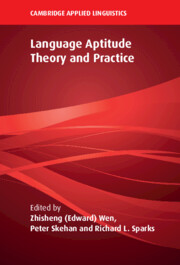Book contents
- Language Aptitude Theory and Practice
- The Cambridge Applied Linguistics Series
- Language Aptitude Theory and Practice
- Copyright page
- Contents
- Figures
- Tables
- Editors and Contributors
- Preface and Acknowledgments
- 1 Language Aptitude Research
- Part I Revisiting and Refining Aptitude Tests
- Part II Aptitude Testing of Diverse Groups
- Part III Innovative Perspectives and Paradigms
- 10 The Neurobiology of Language Aptitude, Musicality and Working Memory
- 11 The Linguistic Coding Differences Hypothesis (LCDH) and L2 Learning
- 12 Variability of Language Aptitude and Working Memory in EFL Learners’ Listening Development
- 13 An Aptitude Model for Translating and Interpreting
- Part IV Aptitude–Treatment Interaction (ATI)
- Part V Final Commentaries
- Index
- References
10 - The Neurobiology of Language Aptitude, Musicality and Working Memory
from Part III - Innovative Perspectives and Paradigms
Published online by Cambridge University Press: 27 May 2023
- Language Aptitude Theory and Practice
- The Cambridge Applied Linguistics Series
- Language Aptitude Theory and Practice
- Copyright page
- Contents
- Figures
- Tables
- Editors and Contributors
- Preface and Acknowledgments
- 1 Language Aptitude Research
- Part I Revisiting and Refining Aptitude Tests
- Part II Aptitude Testing of Diverse Groups
- Part III Innovative Perspectives and Paradigms
- 10 The Neurobiology of Language Aptitude, Musicality and Working Memory
- 11 The Linguistic Coding Differences Hypothesis (LCDH) and L2 Learning
- 12 Variability of Language Aptitude and Working Memory in EFL Learners’ Listening Development
- 13 An Aptitude Model for Translating and Interpreting
- Part IV Aptitude–Treatment Interaction (ATI)
- Part V Final Commentaries
- Index
- References
Summary
In this chapter, we aim to provide a solid review of studies on the neurobiology of language aptitude and the role of two other important variables, namely musicality and working memory. We stress the importance of taking findings from the cognitive neurosciences into consideration and extend current models on language aptitude by taking neurocognitive perspectives into account. We highlight the importance of stable anatomical and functional markers for individual differences in language learning and aptitude and suggest more closely investigating the interdependency between musical abilities, musical training and language learning. While we argue that working memory is an essential prerequisite for language learning and is largely genetically driven, we propose to include musical abilities in a cognitive starter kit for language aptitude.
Keywords
- Type
- Chapter
- Information
- Language Aptitude Theory and Practice , pp. 249 - 274Publisher: Cambridge University PressPrint publication year: 2023

